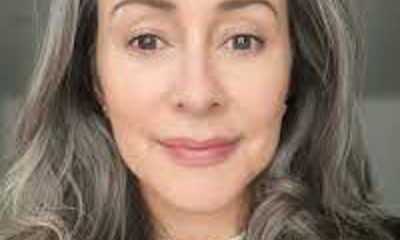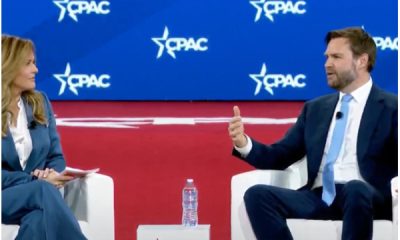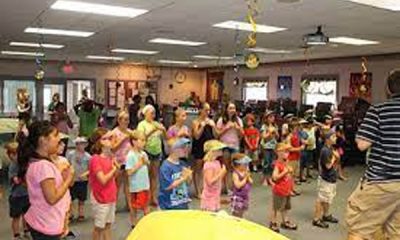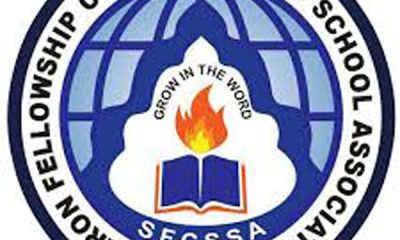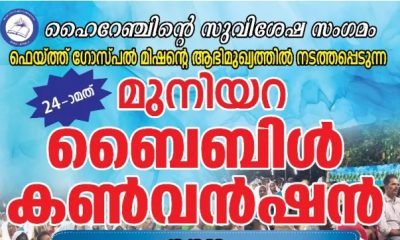us news
Prominent human rights activist Ayan Ali says that he is now a Christian
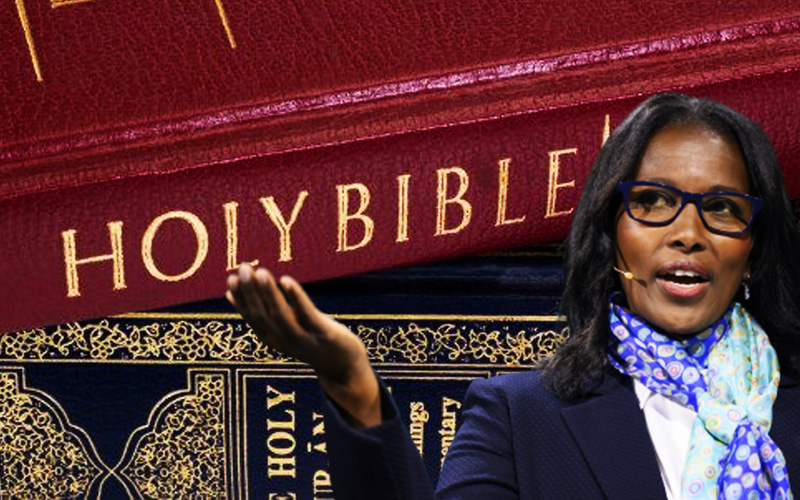
One of the biggest stories of the past few days didn’t happen in Washington or Gaza or Tehran, but was an invisible change that happened inside the heart and mind of one woman: Ayaan Hirsi Ali.
Ayaan is many things: she is a refugee from Somalia, where she was the victim of female genital mutilation; she was a Dutch politician whose criticism of Islam, the religion she was raised in, led to death threats.
Theo van Gogh, her collaborator on Submission, a film about Islam, was murdered in the streets of Amsterdam. The killer left a note stabbed into his body warning that Ayaan would be next.
A normal person would have shut up. But Ayaan is not normal. She wrote a memoir, Infidel. She became a mother. She became an American. And she never, ever quieted her voice.
It is for all of these reasons and many more that Ayaan is one of the great heroes of our time.
She has also been, since the early 2000s, among the most prominent atheists in the world. Or at least she was until late last week, when she announced in the pages of UnHerd that she has converted to Christianity.
The Egyptian intellectual Hussein Aboubakr Mansour wrote in reaction to the news that “Ayaan Hirsi Ali’s announcement of embracing Christianity is one of the biggest pivotal moments culturally since 9/11 and I don’t know how many people actually realize that. Ayaan Hirsi Ali was the poster child of what the New Atheists promised Islam. Not just is she saying that she is not certain about that promise anymore, she is saying she isn’t even certain about the promise of the future the New Atheists could afford themselves.
Mansour continued: “As Western elites ditched Ayaan for the Islamists, Ayaan turned to the ancient fort of Christianity for a last escape.”
Ayaan’s decision to convert prompts a series of very big questions that go to the heart of the challenges facing the West at present: Can religion be justified on pragmatic grounds, or does it require sincere faith? Is an increasingly secular West doomed to lose the civilizational war we find ourselves in? Can Christianity actually serve as a unifying force in that fight? And if religion won’t unite us, what else might?
For today, we wanted to share her essay with you. And we are grateful to our friends at UnHerd for allowing us to reprint it.
In 2002, I discovered a 1927 lecture by Bertrand Russell entitled “Why I Am Not a Christian.” It did not cross my mind as I read it that one day, nearly a century after he delivered it to the South London branch of the National Secular Society, I would be compelled to write an essay with precisely the opposite title.
The year before, I had publicly condemned the terrorist attacks of the 19 men who had hijacked passenger jets and crashed them into the Twin Towers in New York. They had done it in the name of my religion, Islam. I was a Muslim then, although not a practicing one. If I truly condemned their actions, then where did that leave me? The underlying principle that justified the attacks was religious, after all: the idea of jihad or Holy War against the infidels. Was it possible for me, as for many members of the Muslim community, simply to distance myself from the action and its horrific results?
At the time, there were many eminent leaders in the West—politicians, scholars, journalists, and other experts—who insisted that the terrorists were motivated by reasons other than the ones they and their leader Osama bin Laden had articulated so clearly. So Islam had an alibi.
This excuse-making was not only condescending toward Muslims. It also gave many Westerners a chance to retreat into denial. Blaming the errors of U.S. foreign policy was easier than contemplating the possibility that we were confronted with a religious war. We have seen a similar tendency in the past five weeks, as millions of people sympathetic to the plight of Gazans seek to rationalize the October 7 terrorist attacks as a justified response to the policies of the Israeli government.
When I read Russell’s lecture, I found my cognitive dissonance easing. It was a relief to adopt an attitude of skepticism toward religious doctrine, discard my faith in God, and declare that no such entity existed. Best of all, I could reject the existence of hell and the danger of everlasting punishment.
Russell’s assertion that religion is based primarily on fear resonated with me. I had lived for too long in terror of all the gruesome punishments that awaited me. While I had abandoned all the rational reasons for believing in God, that irrational fear of hellfire still lingered. Russell’s conclusion thus came as something of a relief: “When I die, I shall rot.”
To understand why I became an atheist 20 years ago, you first need to understand the kind of Muslim I had been. I was a teenager when the Muslim Brotherhood penetrated my community in Nairobi, Kenya, in 1985. I don’t think I had even understood religious practice before the coming of the Brotherhood. I had endured the rituals of ablutions, prayers, and fasting as tedious and pointless.
The preachers of the Muslim Brotherhood changed this. They articulated a direction: the straight path. A purpose: to work toward admission into Allah’s paradise after death. A method: the Prophet’s instruction manual of dos and don’ts — the halal and the haram. As a detailed supplement to the Quran, the Hadith spelled out how to put into practice the difference between right and wrong, good and evil, God and the devil.
The Brotherhood preachers left nothing to the imagination. They gave us a choice. Strive to live by the Prophet’s manual and reap the glorious rewards in the hereafter. On this earth, meanwhile, the greatest achievement possible was to die as a martyr for the sake of Allah.
The alternative, indulging in the pleasures of the world, was to earn Allah’s wrath and be condemned to an eternal life in hellfire. Some of the “worldly pleasures” they were decrying included reading novels, listening to music, dancing, and going to the cinema—all of which I was ashamed to admit that I adored.
The most striking quality of the Muslim Brotherhood was their ability to transform me and my fellow teenagers from passive believers into activists, almost overnight. We didn’t just say things or pray for things: we did things. As girls, we donned the burka and swore off Western fashion and makeup. The boys cultivated their facial hair to the greatest extent possible. They wore the white, dress-like thawb worn in Arab countries, or had their trousers shortened above their ankle bones. We operated in groups and volunteered our services in charity to the poor, the old, the disabled, and the weak. We urged fellow Muslims to pray and demanded that non-Muslims convert to Islam.
During Islamic study sessions, we shared with the preacher in charge of the session our worries. For instance, what should we do about the friends we loved and felt loyal to but who refused to accept our dawa (invitation to the faith)? In response, we were reminded repeatedly about the clarity of the Prophet’s instructions. We were told in no uncertain terms that we could not be loyal to Allah and Muhammad while also maintaining friendships and loyalty toward the unbelievers. If they explicitly rejected our summons to Islam, we were to hate and curse them.
Here, a special hatred was reserved for one subset of unbeliever: the Jew. We cursed the Jews multiple times a day and expressed horror, disgust, and anger at the litany of offenses he had allegedly committed. The Jew had betrayed our Prophet. He had occupied the Holy Mosque in Jerusalem. He continued to spread corruption of the heart, mind, and soul.
You can see why, to someone who had been through such a religious schooling, atheism seemed so appealing. Bertrand Russell offered a simple, zero-cost escape from an unbearable life of self-denial and harassment of other people. For him, there was no credible case for the existence of God. Religion, Russell argued, was rooted in fear: “Fear is the basis of the whole thing—fear of the mysterious, fear of defeat, fear of death.”
As an atheist, I thought I would lose that fear. I also found an entirely new circle of friends, as different from the preachers of the Muslim Brotherhood as one could imagine. The more time I spent with them—people such as Christopher Hitchens and Richard Dawkins—the more confident I felt that I had made the right choice. For the atheists were clever. They were also a great deal of fun.
So, what changed? Why do I call myself a Christian now?
Part of the answer is global. Western civilization is under threat from three different but related forces: the resurgence of great-power authoritarianism and expansionism in the forms of the Chinese Communist Party and Vladimir Putin’s Russia; the rise of global Islamism, which threatens to mobilize a vast population against the West; and the viral spread of woke ideology, which is eating into the moral fiber of the next generation.
We endeavor to fend off these threats with modern, secular tools: military, economic, diplomatic, and technological efforts to defeat, bribe, persuade, appease, or surveil. And yet, with every round of conflict, we find ourselves losing ground. We are either running out of money, with our national debt in the tens of trillions of dollars, or we are losing our lead in the technological race with China.
But we can’t fight off these formidable forces unless we can answer the question: What is it that unites us? The response that “God is dead!” seems insufficient. So, too, does the attempt to find solace in “the rules-based liberal international order.” The only credible answer, I believe, lies in our desire to uphold the legacy of the Judeo-Christian tradition.
That legacy consists of an elaborate set of ideas and institutions designed to safeguard human life, freedom, and dignity—from the nation-state and the rule of law to the institutions of science, health, and learning. As Tom Holland has shown in his marvelous book Dominion, all sorts of apparently secular freedoms—of the market, of conscience, and of the press—find their roots in Christianity.
And so I have come to realize that Russell and my atheist friends failed to see the wood for the trees. The wood is the civilization built on the Judeo-Christian tradition; it is the story of the West, warts and all. Russell’s critique of those contradictions in Christian doctrine is serious, but it is also too narrow in scope.
For instance, he gave his lecture in a room full of (former, or at least doubting) Christians in a Christian country. Think about how unique that was nearly a century ago, and how rare it still is in non-Western civilizations. Could a Muslim philosopher stand before any audience in a Muslim country—then or now—and deliver a lecture with the title “Why I Am Not a Muslim”? In fact, a book with that title exists, written by an ex-Muslim. But the author published it in America under the pseudonym Ibn Warraq. It would have been too dangerous to do otherwise.
To me, this freedom of conscience and speech is perhaps the greatest benefit of Western civilization. It does not come naturally to man. It is the product of centuries of debate within Jewish and Christian communities. It was these debates that advanced science and reason, diminished cruelty, suppressed superstitions, and built institutions to order and protect life, while guaranteeing freedom to as many people as possible. Unlike Islam, Christianity outgrew its dogmatic stage. It became increasingly clear that Christ’s teaching implied not only a circumscribed role for religion as something separate from politics. It also implied compassion for the sinner and humility for the believer.
Yet I would not be truthful if I attributed my embrace of Christianity solely to the realization that atheism is too weak and divisive a doctrine to fortify us against our menacing foes. I have also turned to Christianity because I ultimately found life without any spiritual solace unendurable—indeed very nearly self-destructive. Atheism failed to answer a simple question: What is the meaning and purpose of life?
Russell and other activist atheists believed that with the rejection of God, we would enter an age of reason and intelligent humanism. But the “God hole”—the void left by the retreat of the church—has merely been filled by a jumble of irrational, quasi-religious dogma. The result is a world where modern cults prey on the dislocated masses, offering them spurious reasons for being and action—mostly by engaging in virtue-signaling theater on behalf of a victimized minority or our supposedly doomed planet. The line often attributed to G.K. Chesterton has turned into a prophecy: “When men choose not to believe in God, they do not thereafter believe in nothing, they then become capable of believing in anything.”
In this nihilistic vacuum, the challenge before us becomes civilizational. We can’t withstand China, Russia, and Iran if we can’t explain to our populations why it matters that we do. We can’t fight woke ideology if we can’t defend the civilization that it is determined to destroy. And we can’t counter Islamism with purely secular tools. To win the hearts and minds of Muslims here in the West, we have to offer them something more than videos on TikTok.
The lesson I learned from my years with the Muslim Brotherhood was the power of a unifying story, embedded in the foundational texts of Islam, to attract, engage, and mobilize the Muslim masses. Unless we offer something as meaningful, I fear the erosion of our civilization will continue. And fortunately, there is no need to look for some New Age concoction of medication and mindfulness. Christianity has it all.
That is why I no longer consider myself a Muslim apostate, but a lapsed atheist. Of course, I still have a great deal to learn about Christianity. I discover a little more at church each Sunday. But I have recognized, in my own long journey through a wilderness of fear and self-doubt, that there is a better way to manage the challenges of existence than either Islam or unbelief had to offer.
Sources:thefp
us news
തങ്ങള് വിശ്വസിക്കുന്നത് ദൈവകൃപയില്, അവിടുത്തെ ഹിതം നിറവേറ്റുവാന് ആഗ്രഹിക്കുന്നു : യുഎസ് വൈസ് പ്രസിഡന്റ് വാന്സ്
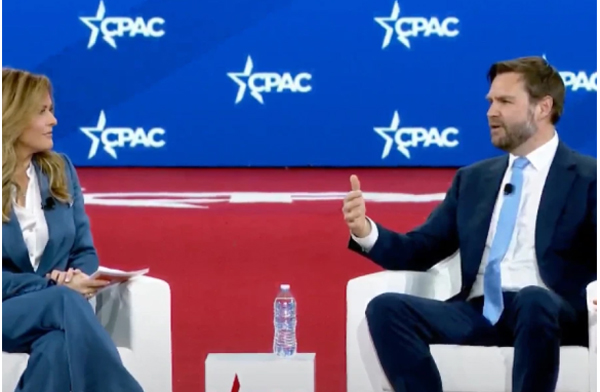
ന്യൂയോര്ക്ക്: ദൈവത്തിന്റെ കൃപയിലാണ് തങ്ങൾ വിശ്വസിക്കുന്നതെന്ന സാക്ഷ്യവുമായി അമേരിക്കന് വൈസ് പ്രസിഡന്റ് ജെഡി വാന്സ്. ഫെബ്രുവരി 20-ന് മേരിലാൻഡിലെ നാഷണൽ ഹാർബറിൽ നടന്ന 2025 കൺസർവേറ്റീവ് പൊളിറ്റിക്കൽ ആക്ഷൻ കോൺഫറൻസിൻ്റെ (CPAC) പ്രധാന വേദിയിലെ അഭിമുഖത്തിനിടെയാണ് അദ്ദേഹം ഇക്കാര്യം പറഞ്ഞത്. ദൈവത്തിൻ്റെ കൃപയിൽ തങ്ങള് വിശ്വസിക്കുന്നുവെന്നും അവിടുത്തെ ഇഷ്ടം നിറവേറ്റുവാന് തങ്ങൾ പരമാവധി ശ്രമിക്കുന്നുണ്ടെന്നും വാൻസ് പറഞ്ഞു.
ധാർമ്മിക തത്വങ്ങളുടെ ഒരു കൂട്ടം മാത്രമല്ല ക്രൈസ്തവ വിശ്വാസത്തിൻ്റെ അടിസ്ഥാനം, മറിച്ച് വിശ്വാസമാണ്. ദൈവപുത്രൻ മനുഷ്യനായിത്തീർന്നു, അവൻ മരിച്ചവരിൽ നിന്ന് ഉയിർത്തെഴുന്നേറ്റു എന്നതാണ് ക്രൈസ്തവ വിശ്വാസത്തിൻ്റെ അടിസ്ഥാനം. ഇതില് നിന്ന് മനസിലാക്കേണ്ട പാഠങ്ങളില് ഒന്ന്, മരണത്തെ ഭയപ്പെടേണ്ടതില്ല എന്നതാണ്. ഒരാളുടെ ജീവൻ നഷ്ടപ്പെടുക എന്ന് പറയുമ്പോള് പ്രധാനമായി ഒരാളുടെ ആത്മാവ് നഷ്ടമാകുമെന്ന് ഞാൻ കരുതുന്നു.
ഗർഭധാരണ കേന്ദ്രങ്ങളെ പിന്തുണച്ചും, കുടുംബങ്ങളെ വളർത്തിയെടുക്കാൻ ആളുകൾക്ക് താങ്ങാനാകുന്ന ചെലവുകൾ കുറയ്ക്കുന്നതിനുള്ള നയങ്ങൾ നടപ്പാക്കിയും, ഭ്രൂണഹത്യയെക്കുറിച്ചുള്ള ധാരണകൾ മാറ്റിയും, ജീവന് തിരഞ്ഞെടുക്കാൻ ആളുകളെ പ്രോത്സാഹിപ്പിച്ചും ജീവന്റെ സംസ്കാരം മുന്നോട്ട് കൊണ്ടുപോകാമെന്നും വാൻസ് അഭിമുഖത്തില് പറഞ്ഞു. പ്രസിഡൻ്റ് ഡൊണാൾഡ് ട്രംപിനെ “അമേരിക്കൻ ചരിത്രത്തിലെ ഏറ്റവും പ്രോ-ലൈഫ് പ്രസിഡൻ്റ്” എന്ന് വാൻസ് വിശേഷിപ്പിച്ചു. അടിയുറച്ച കത്തോലിക്ക വിശ്വാസിയായ വാന്സ് ഭ്രൂണഹത്യയെ അതിശക്തമായി എതിര്ക്കുന്ന നേതാവ് കൂടിയാണ്.
കടപ്പാട് :പ്രവാചക ശബ്ദം
U.S. Vice President JD Vance advocated for government policies and cultural values that encourage Americans to “choose life” and “start families” during an interview on the main stage of the 2025 Conservative Political Action Conference (CPAC) on Feb. 20 in National Harbor, Maryland.
“[People need to] stop thinking about babies as inconveniences to be discarded,” Vance said in a Thursday morning interview with Mercedes Schlapp, a senior fellow at the American Conservative Union Foundation and the wife of ACU chairman and CPAC organizer Matt Schlapp.
“We’ve got to start thinking of them as blessings to cherish,” Vance said.
During the interview, Vance noted that the United States Supreme Court decision to overturn Roe v. Wade completely changed the abortion debate in the country by allowing the “will of the people to speak on the life issue” and removing it from “unelected bureaucrats” and “unelected judges.”
Vance suggested advancing a culture of life by supporting pro-life pregnancy centers, enacting policies to bring costs down so people can afford to raise families, changing perceptions about abortion, and encouraging people to choose life.
“Maybe they’ll start thinking of babies as the blessings that we all know that they are,” Vance said.
Vance referred to President Donald Trump as the “most pro-life president in American history” for nominating three of the justices who joined the majority opinion to overturn Roe v. Wade. However, he did not address the concerns pro-life advocates have raised with Trump’s recent executive order to expand and reduce the costs of in vitro fertilization , a fertility treatment in which human embryos are routinely destroyed.
Discussing his faith, the vice president, who is a convert to Catholicism, described himself as “very pro-life” and “a devout Christian.”
I just marvel at how real, and exceedingly impressive this guy @JDVance is. We are so blessed to have him as our VP.
“We put our faith in God above, we put our faith in the grace of God, and we try our best to do his will,” Vance said.
Vance discusses immigration, the economy, and energy
During the interview, Vance said the 2024 election gave Trump a “historic mandate on a few issues,” specifically on his efforts to deport immigrants who entered the country illegally, his plans to expand domestic energy and improve the economy, and his actions to reduce waste, fraud, and abuse within the government.
“The American people gave us a window to save the country and that’s exactly what we’re going to do,” the vice president said.
Vance spoke about Trump’s deportation efforts, his restrictions on border crossings, and his decision to designate drug cartels as foreign terrorist organizations. He said his message to drug traffickers is for them to “get the hell out of our country.”
“Your free ride is over because President Trump is back in the Oval Office,” Vance added.
The vice president said Trump intends to “unleash American energy” with policies such as more drilling for oil on American land. This, he said, will “do more than anything” to help the economy because high costs of fuel increase costs for other things.
He also said Trump will ensure “other countries stop taking advantage of us,” extend his tax cuts, and end taxes on tips. He praised the work of the Department of Government Efficiency (DOGE) to stop “wasting [taxpayer money] on garbage.”
“We want your children and grandchildren to be able to raise a family in security and comfort in the country we all love,” Vance said.
Schlapp’s interview with the vice president kicked off CPAC’s three-day conference. Other figures scheduled to speak at the annual event include Trump, Tesla CEO Elon Musk, Republican lawmakers and administration officials, foreign leaders, and various conservative media personalities.
http://theendtimeradio.com
us news
Bible Lessons for School Kids Are Shining Hope in Challenged Cities
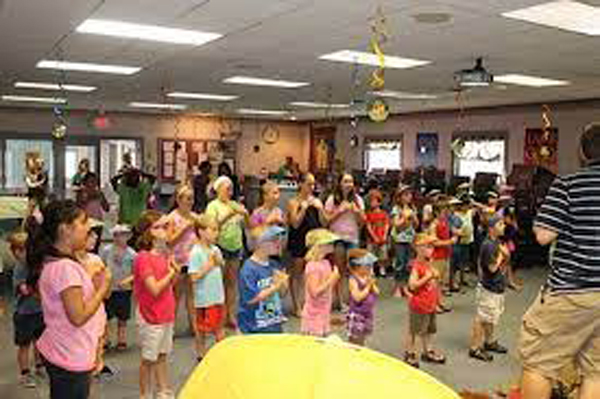
Johnstown, Pennsylvania, a city once thriving as a booming steel town, now faces significant economic challenges, including one of the nation’s highest poverty rates. Yet, in the midst of hardship, faith-based programs are stepping in to inspire the next generation, offering truth, purpose, and hope for the future.
The view here in Johnstown is excellent—it’s a city with a rich past, but it has fallen on some difficult times. That includes a series of devastating floods, beginning with the infamous 1889 disaster. Then the economy took a serious downturn after Bethlehem Steel pulled out, and now, in its wake, there’s a lingering sense of hopelessness.
But even a city in a dark valley can shine a light. Programs like Bible2School are bringing faith to the next generation, teaching children about Jesus and instilling a sense of purpose.
“People kind of expect bad things,” says Pastor Doug Black of Liberty Grace Church. “They’ve grown up in this generational expectation that nothing good’s going to happen in Johnstown. So, it’s hard to give them hope because it’s not what they’ve experienced.”
Local pastors are meeting weekly for prayer, seeking spiritual renewal for their city. This week, they gather on a rooftop, standing in the gap for Johnstown. “God, the gospel is good news, Lord,” prays Pastor Terry Knipple. “The city of Johnstown is struggling, and they need good news.”
Their prayers may be finding an answer in the next generation. While student engagement can be a challenge for public schools, children in Johnstown are eagerly skipping lunch and recess to learn about the Bible through Bible2School.
“And who or what is the rock? That firm foundation? What does that rock represent?” asks a teacher in one of the classes.
“Jesus! The Bible!” the students respond enthusiastically.
“So many of the kids have never been told that Jesus loves them,” says Stacy Novak, Executive Director of Bible2School Laurel Highlands. “We have conversations with them, ‘Do you know that you are valued, and do you know you are loved?’ It’s like they’re hearing this for the very first time.”
Bible2School, a nonprofit organization, offers off-campus Bible classes to students in grades two through four in an area where less than 20% of residents regularly attend church. The program has seen remarkable growth, expanding from 82 registered students in 2018 to 850 today—an increase of 900 percent.
“We know a handful of families who’ve started going to church as a result of their children participating,” Novak says. “So, it doesn’t just reach the children. It reaches their siblings, their parents, grandparents.”
For students like Anhori, the program is life-changing. “It’s helping me learn more about Jesus and God and how I can grow closer to Him,” she says, telling CBN News her family is thinking about finding a church.
Katie Green, Johnstown Site Director for Bible2School, knows the struggles of the community firsthand. Growing up in a single-parent household, she relates to the challenges many of these children face. “I have always felt very strongly that within our program, we have little Davids and little Esthers—that God is rising up for a time like this,” Green says.
Yet, for many of these children, the challenges continue after school. Unstable housing, hunger, and loneliness are realities for many families. That’s where New Day, another faith-based program, steps in.
“I can tell you the kids are their spiritual leaders in their households,” says Chris Plaza, leader and facilitator of New Day’s afterschool children’s programming. “We have a lot of parents who can’t read or write—so it’s almost like their children are their educators.”
New Day provides a safe space for children after school, offering a warm meal, the gospel message, and time together. Without it, many kids would end up on the streets.
“I’m excited about Johnstown,” says Pastor Ray of Journey Church. “For years, everybody was down on it because of the drugs, the lack of jobs, things like that. And it was all just gloom and doom. I thought, why not Johnstown? Why can’t we be the epicenter of revival for our country and for our state?”
In a city scarred by economic setbacks and natural disasters, Bible2School and New Day stand out as beacons of hope. With each prayer and each family touched, a new layer is added to this young generation’s foundation of faith.
“We believe this rooftop is our watchtower,” says Josh Knipple of New Day. “Seeing what God sees in the city, seeing what’s to come… Instead of seeing poverty, we see hope.”
As the children pray, “For thine is the kingdom, the power, and the glory… forever and ever—amen,” it’s clear that in Johnstown, faith is lighting the way to a brighter future.
Sources:CBN News
us news
Nearly 2,000 Students Choose Christ in 1 Night at Ohio State: ‘God Is Moving in This Generation’
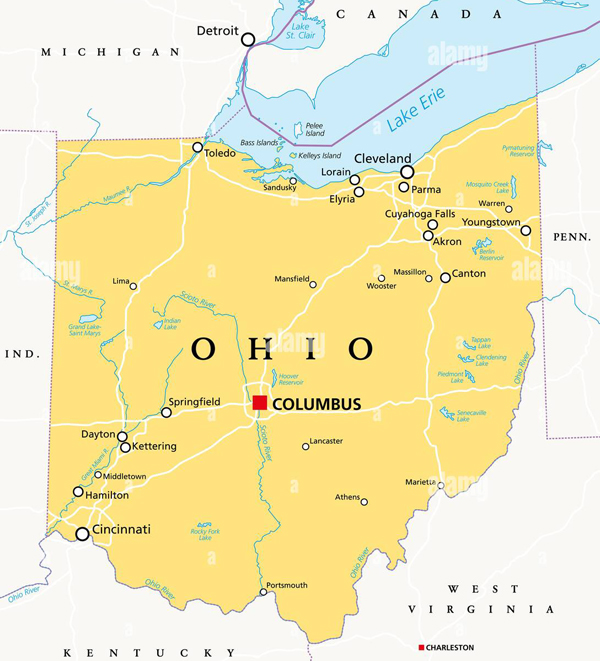
Thousands of college students gathered at Ohio State University on Tuesday night to seek the hope that’s found in the gospel of Jesus Christ, and nearly 2,000 of them made decisions to give their hearts to God.
It was the second massive revival event of 2025 organized by the Unite US movement, and this time students braved sub-freezing temperatures down in the teens to get baptized in the backs of U-Haul trucks.
“We’ve been in awe of how God has already been moving on this campus over the past year, and He met us here again tonight,” Unite US said in a social media post. “Over 6,500 students gathered in The Schott to lift the name of Jesus and almost 2,000 responded to the altar call – experiencing the freedom only He can bring.”
“God is moving in this generation, and we know that He’s just getting started!” the post exclaimed.
Tonya Prewett, the founder and visionary behind Unite US, also posted to Instagram saying, “What a night at The Ohio State University! …close to 2,000 students made a decision to go all in with Jesus! I am in awe of how God is moving on college campuses!”
The Ohio State revival follows a Unite US outreach held last week at the University of Kentucky where more than 2,000 students gave their lives to Jesus Christ and many were baptized as well.
The next Unite US outreach will be held at Purdue University in Indiana on March 5. Since September of 2023, the ministry’s events have reached more than 70,000 college students across multiple campuses.
Sources:CBN News
-

 Travel9 months ago
Travel9 months agoയാക്കൂസ കരിഷ്മ:ഓല സ്കൂട്ടറിനേക്കാൾ വിലക്കുറവിൽ കുഞ്ഞൻ കാർ; സിറ്റി യാത്രകൾക്ക് ഇനി ഇവൻ മതിയാവും
-

 Movie3 months ago
Movie3 months agoFor KING + COUNTRY Stars’ Big Plan to Bring Message of Jesus, ‘Redemption of Humanity’ to People Across America
-
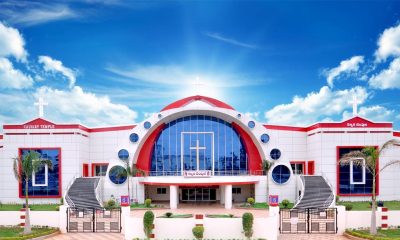
 National12 months ago
National12 months ago300,000-Member Indian Church to Plant 40 More Megachurches
-

 National12 months ago
National12 months agoനെയ്തേലിപ്പടി ക്രൂസേഡിന് അനുഗ്രഹീത സമാപ്തി
-

 Tech8 months ago
Tech8 months agoചിത്രങ്ങൾ എഡിറ്റ് ചെയ്യാം; വാട്സ്ആപ്പിലെ ‘നീല വളയം’ സ്മാർട്ടാകുന്നു, കാര്യമായ മാറ്റങ്ങൾ
-
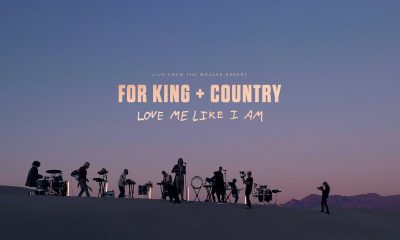
 Movie3 months ago
Movie3 months agoFor KING + COUNTRY Stars’ Big Plan to Bring Message of Jesus, ‘Redemption of Humanity’ to People Across America
-
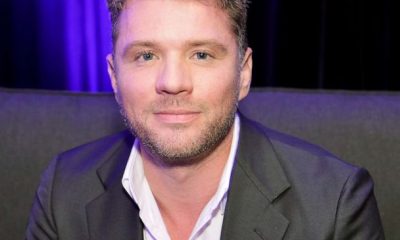
 Movie11 months ago
Movie11 months agoActor Ryan Phillippe ‘Craving’ Relationship With God After Movie About Christian Missionary
-

 Articles9 months ago
Articles9 months ago8 ways the Kingdom connects us back to the Garden of Eden


